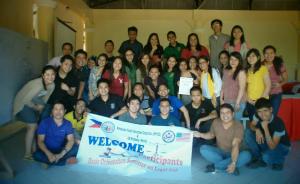 Delegates and organizers of the Basic Orientation Seminar on Legal Aid.[/caption]
Delegates and organizers of the Basic Orientation Seminar on Legal Aid.[/caption]When you become lawyers, in what field of the law you want to be engaged?
On the second day of the two-day Basic Orientation Seminar on Legal Aid Atty. Neil Pacamalan, Cultural Affairs Specialist for Mindanao of the US Embassy, Manila, asked that question to the delegates from the University of Mindanao and Ateneo de Davao University College of Law.
The question drew a variety of response: commercial law, criminal law, international law, labor law, among others. Few mentioned about public interest lawyering, which others call alternative lawyering or developmental lawyering.
[caption id="attachment_2478" align="alignleft" width="144"]
 Atty. Neil Pacamalan[/caption]
Atty. Neil Pacamalan[/caption]This type of lawyering, according to Atty. Pacamalan, is devoted to lending legal assistance and empowering such marginalized groups as urban poor, farmers, or fishers. He said these are the groups that are historically, culturally, and economically marginalized.
Atty. Pacamalan is convinced that involvement in alternative lawyering is not detrimental to the law students’ studies. He surmises that while UP, ADMU, and San Beda excel in the Bar Exams, the three are able to maintain a robust legal aid centers.
He said that alternative lawyering should not be a second choice only, reiterating what former Chief Justice Hilario Davide, Jr. said.
“To me it is troubling that the lawyers who advocate such worthy causes are called the alternative,” said Davide at the First Alternative Law Conference on November 8, 1999. “An alternative is a second choice. You should be considered the mainstream, the first choice, the true and ideal lawyers. Better yet, the conscience of the legal profession.”

No comments:
Post a Comment